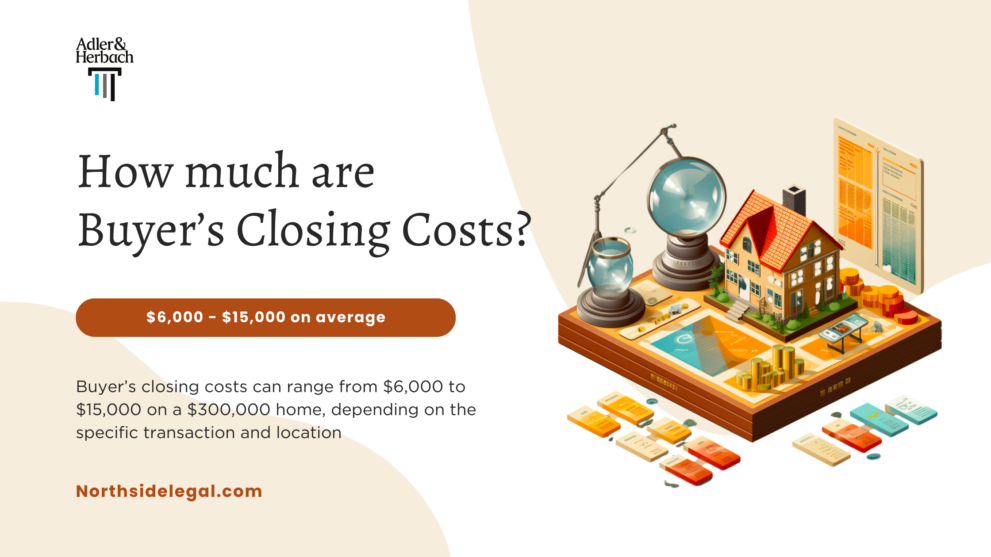Buying a home is an exciting process, but it also comes with many fees and expenses. As a buyer, you can expect to pay 2% to 5% of the purchase price in closing costs when you finalize the transaction. Knowing the common closing costs ahead of time helps you budget and negotiate the best deal. This guide will explain the typical closing fees and charges paid by home buyers.
How much are Buyer’s closing costs?
The closing costs for buyers include appraisal fee ($350-$650), home inspection fee ($350-$750), title insurance fees ($1000+), closing agent/settlement fees ($1500-$3000), recording fees, transfer taxes (varies), HOA transfer fees ($100-$500) and more.
Buyers may also have additional loan related expenses such as credit report fee, loan origination fee, discount points, rate lock fee, mortgage insurance premiums, prepaid interest, property taxes escrows, homeowners insurance premium, courier fees, wire transfer fees, etc.

What Are Closing Costs?
Closing costs are the fees and charges associated with finalizing a real estate transaction. They are paid at closing when you take possession of the property. Closing costs include charges for the mortgage lender, appraisal, title fees , legal fees, taxes, and more. The buyer traditionally pays the majority of the closing costs, while the seller pays the real estate commission.
Average Closing Costs for Buyers
On a $300,000 home, expect to pay $6,000 to $15,000 in closing fees as the buyer. With a higher priced home, closing costs will increase. Closing costs range from 2% to 5% of the total purchase price on average. The exact total depends on your specific transaction, location, and type of mortgage.
1. Earnest Money Deposit
After signing the purchase agreement with the seller, the buyer typically submits an earnest money deposit to demonstrate their serious intent to complete the purchase. This is not technically a fee, since it will be applied to the purchase price of the property.
The earnest money deposit is usually 1-5% of the purchase price. It is held in escrow by the title company or real estate agent until closing. At closing, the earnest money deposit goes toward the down payment on the home. If the buyer defaults on the purchase contract, they may forfeit the earnest money deposit to the seller.
2. Down Payment
The down payment is the portion of the home’s purchase price that the buyer pays in cash.
Conventional loans require a minimum down payment of 3-20% of the purchase price, depending on the type of mortgage.
First-time and low-income buyers may qualify for special mortgage programs like FHA, VA, and USDA loans which allow down payments as low as 0-3.5%. The higher the down payment, the lower the monthly mortgage payments will be.
At closing, the down payment funds are disbursed by the title company to the seller.
3. Appraisal Fee
The mortgage lender requires a professional appraisal report to confirm the property is worth at least the amount of the purchase price.
Appraisal fees typically range from $350-$650 depending on the area and whether it’s a single-family home or condo. The appraisal provides an unbiased estimate of the property’s fair market value based on recent comparable sales, construction quality, upgrades, etc. The appraisal fee gets paid to the appraiser at the time the appraisal is performed.
4. Home Inspection Fee
While not required, it is highly advisable for buyers to hire a professional home inspector to examine the property prior to closing. The standard home inspection fee ranges from $350-$750 for a single family home.
The standard home inspection checks the home for defects, safety hazards, and system/appliance functionality that could cost thousands in repairs if not addressed before closing. It gives buyers negotiation leverage if repairs are requested from the seller prior to closing.
Additional fees may apply for extra services:
Lead-based paint inspection
For homes built before 1978, the seller must provide a lead-based paint disclosure. The buyer can optionally pay for a professional lead paint inspection, which costs around $250 to $350, if concerned about exposure. The inspection tests paint chips for dangerous levels of lead that could pose health hazards if inhaled or ingested.
Pest inspection
The buyer may also choose to pay for a professional pest inspection of the property before closing. This costs around $100 to $150 on average. It checks for termites, ants, rodents, or other pest infestations that could damage the property if left untreated.
5. Title Insurance Fees
Title insurance protects against future claims against the property’s title or ownership rights. There are two policies – a lender’s policy to protect the mortgage lender, and an owner’s policy to protect the home buyer’s interests.
In Illinois, a buyer is responsible to pay for the lender’s policy, which is usually around $575 together with any required endorsements, which can add another several hundred dollars. Expect these fees to add up to around $1000.
6. Closing Agent/Settlement Fees
The closing agent fee pays for the neutral third party that oversees the closing process. This fee ranges from $1500-$3000 depending on the purchase price.
The closing agent reviews all documents, conducts the closing, disburses funds, and ensures the transaction is completed legally and accurately. They may also be referred to as an escrow agent or settlement officer. Closing services in Illinois are typically provided by the title company.
7. Recording Fees
When the new property deed and mortgage are officially recorded in county public records, recording fees must be paid. Recording fees are set by each county.
For example, Cook County, IL charges $107 per document. Recording the deed and mortgage protects the buyer’s ownership rights and provides public notice of any liens against the property.
8. Transfer Taxes
Transfer taxes are assessed when a property title is transferred from one owner to another. Transfer tax rates and payment responsibility (seller vs buyer) vary by state and county.
For instance, in Illinois the seller pays the state and county transfer taxes while the Chicago city transfer tax is split between buyer and seller.
Transfer taxes are based on the home’s sale price. These taxes generate revenue for local governments to fund services.
9. HOA Transfer Fees
If the home is part of a homeowner’s association (HOA), there is often a transfer or move-in fee charged when the property ownership changes.
Buyer’s HOA transfer fees can range from $150 to $1000 on average. This cost covers changing the HOA membership records, setting up the new homeowner in the association and may also include a move-in fee or deposit. The HOA transfer fee is normally paid at closing.
10. Tax Monitoring and Status Research Fees
Lenders may charge tax monitoring and tax status research fees of $75 to $200 to check for any outstanding property taxes or tax liens on the property.
These fees cover the costs of researching with local tax authorities to verify all property taxes are current with no delinquent bills or liens against the home. This protects the lender’s interests in the property used as collateral for the mortgage loan.
11. Flood Determination and Monitoring Fee
The flood determination and monitoring fee costs between $10 and $20. This covers the cost of checking if the property is located in a government-designated flood zone. It also pays for monitoring the property for any changes to the flood zone boundaries during the life of the mortgage.
Lenders require this due to strict regulations around providing federally-backed mortgages for homes at high risk of flooding.
12. Credit Report Fee
Mortgage lenders order a copy of the buyer’s credit report to evaluate their creditworthiness for loan approval.
Credit report fees are usually less than $50 per person. Married couples applying jointly would each have a credit report pulled. The lender may also charge for a tri-merge report that includes scores from the three credit bureaus. Credit report fees are paid to the lender at closing.
13. Loan Origination Fee
Also called a loan processing fee or underwriting fee, this charge covers the lender’s administrative costs to prepare, process, and underwrite the mortgage loan. It includes expenses like paperwork, verification, calculations, risk evaluation, and staff time.
Since it’s based on a percentage of the loan amount, the origination fee is higher for larger mortgages. Not all lenders charge origination fees so it’s wise to shop around.
14. Discount Points
Mortgage discount points allow the borrower to pay more upfront to lower the interest rate on their loan. Each discount point costs 1% of the total loan amount.
Paying additional points makes sense if the borrower plans to keep the mortgage long-term since the monthly savings exceed the upfront cost over an extended period of time. Discount points are optional.
15. Rate Lock Fee
Sometimes there is a rate lock fee charged to lock in a specific mortgage interest rate while the loan is being processed and approved.
Rate lock fee can be around 0.25% to 0.5% of the total loan amount. It’s often built into the interest rate rather than charged as a separate fee. Locking in the rate protects buyers from rate hikes during the approximately 30-45 days it takes to close once an offer is accepted.
16. Mortgage Insurance Premiums
If the down payment is less than 20% of the purchase price, private mortgage insurance (PMI) is required on conventional loans to protect the lender from default risk. The PMI premium can be paid monthly or upfront at closing.
- For FHA loans from the Federal Housing Administration, you pay an upfront mortgage insurance premium of 1.75% of the full loan amount. You also have to pay an annual mortgage insurance premium, and that amount changes based on factors like the loan amount, down payment, and loan term.
- USDA loans from the Department of Agriculture for rural buyers with low/moderate incomes require an upfront guarantee fee of 1% of the loan amount. You also pay an annual fee of 0.35% of the loan amount.
- VA loans for veterans through the Department of Veterans Affairs don’t need PMI. But VA loans charge a funding fee ranging from 1.4% to 3.6% of the loan amount based on your down payment and previous use of a VA loan.
17. Prepaid Interest
Mortgage payments are due at the end of each month but interest starts accruing as soon as funds are disbursed at closing. Prepaid interest covers the first partial month.
For example, if closing is Jan 12th, prepaid interest pays for the 20 days until Jan 31st. This fee depends on the loan amount, rate, and closing date.
18. Property Taxes
The lender (and sometimes the title company) collects a tax escrow deposit at closing based on the home’s assessed value and tax rate so funds are available to pay for upcoming tax bills.
19. Homeowners Insurance
Lenders require home buyers to prepay the first year’s homeowners insurance premium at, or before, closing. Rates vary based on factors like property type, location, age, claims history, etc.
Premiums for $200,000 dwellings often range from $1000 – $2000 per year based on policy deductibles and coverage selected.
20. Courier Fees
The title company may charge a small courier fee for overnight document delivery services during the closing process.
Courier fees are typically $25-$50 to pay for FedEx or UPS. Checks, loan documents, contracts, and recording documents need to be rapidly exchanged between parties to meet closing deadlines.
21. Wire Transfer Fees
Mortgage funds, down payment, and closing costs are delivered electronically through wire transfers coordinated by the title company. There is usually a flat $50 charge each to buyer and seller to cover wires for the closing.
Wires provide a fast, secure method for transferring large dollar amounts in and out of escrow prior to closing.
22. Government Recording & Transfer Fees
Recording fees pay for filing the property deed and mortgage with the county recorder’s office to make the transaction a matter of public record.
Transfer taxes compensate state and local governments when a property changes ownership. Specific fees vary by location but, depending on the property location and purchase price, expect to pay several hundred to a few thousand dollars in total government-related fees at closing.
23. Home Warranty Plan
Optional home warranty plans cover repairs and replacements for appliances, HVAC systems, and electrical/plumbing components for 1 year post-closing.
Home buyers can purchase a warranty plan for around $300-$600 to help offset costs in case covered parts and equipment break down. Home warranties provide peace of mind but read the fine print!
24. Attorney Fees
Home buyers in Illinois typically hire a real estate attorney to represent their interests for around $550-$1000. Attorney fees vary based on experience and services, such as:
- Reviewing purchase documents and advising clients on contents
- Negotiating terms of the real estate purchase agreement
- Overseeing the closing process and attending closing
- Resolving title issues, liens, or claims against the property
- Providing counsel on complex real estate matters
A real estate attorney can help guide buyers through the documentation, negotiate better terms, and provide experienced legal advice during the transaction.
25. Miscellaneous Fees
Other random fees may pop up on your closing disclosures. These miscellaneous lender or title company fees should not add up to more than a couple hundred dollars.
Learn more about
The Closing Process
Now that you know the various closing costs buyers can expect to pay, let’s walk through a general overview of the closing process and what happens along the way:

- Purchase Contract – The process begins when the buyer and seller agree to terms on a real estate purchase agreement or sales contract. This sets the purchase price and closing date.
- Earnest Money – The buyer submits earnest money to show their serious intent. This deposit is held in escrow until closing.
- Loan Application – The buyer applies and gets approved for a mortgage loan based on credit, income, assets, and property.
- Appraisal & Inspections – The property must be professionally appraised at or higher than the purchase price. Optional inspections identify any needed repairs.
- Title Work – The title company researches property records to verify clear, legal title so ownership can transfer.
- Closing Disclosures – Closing figures are finalized on the Closing Disclosure form provided 3 days before closing. This outlines total closing costs for buyer and seller.
- Down Payment & Closing Costs – The buyer wires their down payment and closing cost funds to the title company’s escrow account. The lender provides the balance of purchase funds.
- Final Walkthrough – The buyer does a final property walkthrough to verify condition and required repairs are completed.
- Closing – Buyer, seller, and agents review and sign all closing documents. Deed and keys are exchanged.
- Recording – The property deed and mortgage are recorded with the county to complete the ownership transfer.
- Possession – The buyer takes possession of the home on the agreed closing or possession date.
How to Save on Closing Costs?
While closing costs are typical, here are some ways to lower your closing fees:
- Shop around for the best rates: Get quotes from multiple lenders to negotiate the lowest interest rate and origination fees.
- Ask about lender credits: Some lenders offer a lender credit, essentially discounting your closing costs.
- See if seller can cover costs: You can request the seller pays for some of your closing fees or offers a closing cost credit.
- Pay discount points for a better rate: Paying discount points upfront can lower your long term interest costs.
- Compare title and escrow companies: Look for lower rates on title insurance, escrow services and attorney fees.
- Examine the loan estimate: Review your Loan Estimate for any unwanted fees you can ask to have removed.
- Increase your downpayment: A larger downpayment percentage means lower loan fees overall.
The Bottom Line on Closing Costs
Closing costs easily run between 2% to 5% of the total purchase price. Being an educated home buyer is key to handling the closing process with confidence. Knowing which closing costs are usual versus excessive can prevent overpaying.
Make sure to shop around for the best mortgage rates and title fees. While closing fees are an unavoidable part of buying a home, taking the right steps can help minimize these upfront costs.


